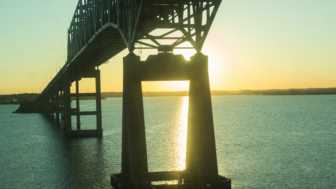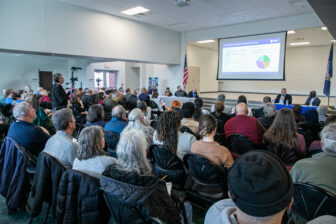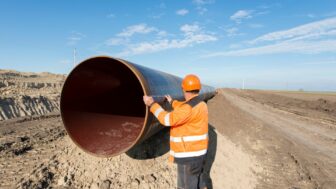Baltimore, Md.—Last night, the Baltimore City Council took its first step toward addressing the dangers of potentially explosive crude oil trains running through the city. Council President Jack Young introduced a bill that would require the first-ever city study of the health and safety risks posed by transporting crude oil by rail through Baltimore. Every member of the city council is a cosponsor of the ordinance (Bill 16-0621).
The bill would require the City Health Department to study the public health and safety risks oil trains pose to communities along rail lines. It also requires public outreach to inform residents of the study findings and directs city agencies to incorporate those findings into their incident response plans.
“Having a plan in place is instrumental to effectively tackling any situation that may unfold in the transportation of crude oil by rail,” said City Council President Jack Young. “The City of Baltimore is pleased to partner with the Chesapeake Climate Action Network to ensure the safety and health of our residents.”
Over 165,000 Baltimore residents live within a mile radius of train tracks known to transport highly volatile and explosive crude oil, putting them in the potential impact zone of a derailment and disaster. Recently, a Maryland judge ruled against rail companies CSX and Norfolk Southern, which were trying to block the state from releasing oil train routes to the public.
Released documents show that crude oil trains run along 26th street in Charles Village, through the Howard Street Tunnel, next to Camden Yards and Ravens Stadium, and over Gwynn’s Falls. Trains then travel through Morrell Park, Mt. Winans, Westport and Brooklyn on their way to a rail-to-barge terminal in the Fairfield Peninsula next to Curtis Bay, where oil is then shipped out of the harbor to East Coast refineries.
“Trains carrying North Dakota crude oil, known to be highly explosive and volatile, put neighborhoods like Westport in a vulnerable and dangerous situation,” said Keisha Allen, president of the Westport Community Association, which represents an area directly adjacent to routes used by crude oil trains. “As crude-by-rail traffic has increased, so have accidents, posing significant risks to the environment, homes, and our lives.”
“Baltimore communities deserve to know what’s at risk when oil trains roll through their neighborhoods,” said Jon Kenney, Healthy Communities Organizer with the Chesapeake Climate Action Network. “Passing this bill is the first step to raising awareness and taking action to protect Baltimore communities. Ultimately, much more is needed at all levels, city, state, and federal, to prevent a potential human and environmental disaster.”
Five explosive oil train derailments have occurred in the U.S. and Canada over the past year. The worst North American oil train disaster occurred in July of 2013, when a train carrying explosive Bakken crude oil from North Dakota derailed and exploded in Lac-Mégantic, Quebec, causing the deaths of 47 people. The closest oil train derailments to our area occurred in Mount Carbon, WV in February of 2015; and Lynchburg, Virginia in April of 2014. Because crude oil is shipped through and out of Baltimore, a similar disaster could happen here, or anywhere trains travel through Maryland to the city.
To highlight the risks oil trains pose to Baltimore residents, and discuss ways to take action, the Chesapeake Climate Action Network is holding a town hall meeting on Thursday, February 11th at 7pm in Charles Village. The event will feature a mom who lived through the Lac-Mégantic tragedy, City Council representatives, and experts on the issue. Attendees will also learn how they can get involved in city and statewide efforts to address the dangers of oil trains. The event will take place at the 2640 Space at St. John’s Church, 2640 St. Paul St., Baltimore, MD 21218.
RESOURCES:
- View information about the ordinance on the City Council website: https://baltimore.legistar.com/LegislationDetail.aspx?ID=2557511&GUID=3360B46C-5F17-48A0-B7E9-A302B8A72549&Options=ID%7cText%7c&Search=16-0621&FullText=1
- View a PDF of the ordinance at: http://chesapeakeclimate.org/wp-content/uploads/2016/01/Baltimore-Ordinance-Oil-Trains.pdf
- See the ForestEthics Oil Train Blast Zone map to find which Baltimore areas are in the one-mile impact zone: http://explosive-crude-by-rail.org/
Contact:
Jon Kenney, 240-396-1985, jon@chesapeakeclimate.org
Kelly Trout, 240-396-2022, kelly@chesapeakeclimate.org
###





